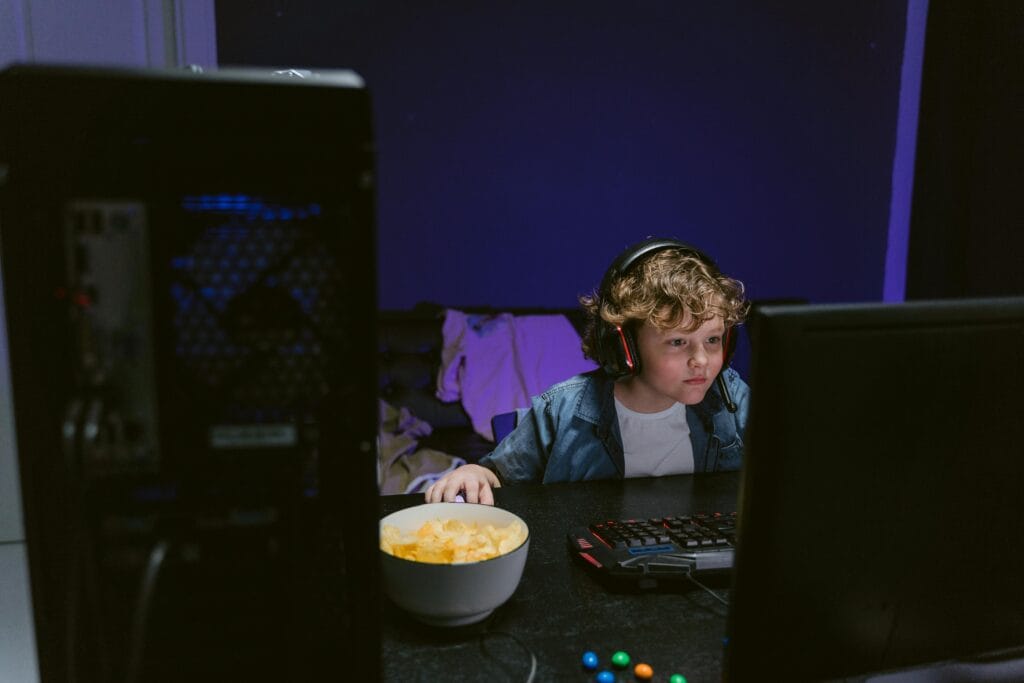Brian, a 12-year-old boy, loved playing online games. One day, he met “Jake12” in a multiplayer game. Jake12 claimed to be 12, too, and they quickly became friends. They played together every day, laughing and strategizing.
Over time, Jake12 started asking personal questions—where Brian lived, and what school he went to. “I wish we could hang out in real life,” Jake12 said. “Send me a picture so I know what my best friend looks like!”
Something felt off. Brian remembered his mom’s warning: Never share personal information online. His gut told him not to respond. Instead, he told his parents.
They checked Jake12’s profile and found inconsistencies—things that didn’t add up. His dad helped report the account to the gaming platform. A few days later, they got a message: Jake12 wasn’t a kid—he was an adult pretending to be one.
Brian felt sick. What if he had shared his photo? His address? He realized how close he had come to real danger. From then on, he played more cautiously, only adding people he knew in real life.
That day, Brian learned that in the online world, not everyone is who they claim to be

The Danger Behind the Fun
Online gaming has become a significant part of children’s lives, offering entertainment and social interaction. However, parents need to be aware of the time their children spend on these platforms, understand the potential risks as shown in the story ok Jake, and implement strategies to ensure their safety. The anonymity of online gaming serves as an escape from real-life challenges for many children. They can meet with their peers, socialize, become friends, and have fun doing what they enjoy in common: gaming. However, not all gamers who claim to be their “peers” are really their peers.
Research shows that there are many dangers of online gaming. Even when there is less danger, the amount of time kids spend on online gaming can be a problem in itself. In this article, we will explore the downside of online gaming and what you can do as a parent to help your kids game responsibly and ensure their safety while they enjoy the fun of online gaming
Online Games: A Time-Consuming Fun
Recent data indicates that children are dedicating substantial amounts of time to online gaming. For instance, a study focusing on Australian children revealed that those who play Roblox spend an average of 137 minutes daily on the platform. While gaming can offer cognitive benefits and stress relief, excessive screen time has been linked to issues such as sleep deprivation, anxiety, and addiction. A report by CyberSafeKids highlighted that increased smartphone usage among primary school children contributes to these challenges. This is because it encourages a sedentary lifestyle which sees players sitting opposite their screens for an unhealthy duration.
Dangers to watch out for
Inappropriate Content:
Some games may contain or provide access to violent, sexual, or otherwise unsuitable material for children. For example, concerns have been raised about platforms like Roblox, where children have reportedly encountered sexually explicit content.
Online Predators:
The interactive nature of online games can expose children to individuals with malicious intent. Predators may use gaming platforms to initiate contact and build trust with young players. Adults who are out to lure kids into danger sign up on these gaming platforms claiming that they are kids, befriending kids, and exploiting them. They position themselves as allies of the kids and the only one who understands. The story of Brian at the beginning of this article is a good example of this
Cyberbullying:
Children may experience harassment or bullying from other players, leading to emotional distress. This often starts with poor gaming sportsmanship where one gamer harasses another with their style of play. Such as “grieving” players by making games less enjoyable or even frustrating. Gamers can also send harmful messages or chats during games. The anonymity of online gaming sometimes encourages these negative behaviors.

Privacy Risks:
Children are easily manipulated. They might inadvertently disclose details that could be misused. Sharing personal information within games can lead to privacy breaches or identity theft, making it easy for predators to thrive
Hidden Costs:
Many games offer in-app purchases, which can lead to unexpected expenses if not monitored. Children may not understand the real-world financial implications of these transactions.
Your Kids’ Safety: What you can do
- Educate Your Child: Discuss the potential risks associated with online gaming. Encourage them to report any uncomfortable interactions and emphasize the importance of not sharing personal information. They should never use derivatives of their names, addresses, and other personal information as their username or password. This is to avoid piecing their credentials together to arrive at your kid’s personal information
- Use Parental Controls: Utilize the parental control features available on gaming platforms and devices. These tools can help monitor and limit your child’s gaming activities. Always ensure that you know what gamed your child is playing and the amount of time that is involved. Remember, your kids rely on you to help them navigate life at this stage. Help them games safely!
- Set Time Limits: Establish clear guidelines on the amount of time your child can spend on gaming daily to prevent excessive use. You can establish gaming time and stick to it. It is advisable that kids play games after they have completed their school works and house chores before playing. Enforcing this would teach your kids responsibility, prioritizing and time management.
- Monitor Game Content: Review the games your child plays to ensure they are age-appropriate. Be aware of the content and the nature of interactions within the game. Help them choose games that would not introduce negative treats like violence and other anti-social behaviours.
- Encourage Open Communication: Maintain an open dialogue with your child about their gaming experiences. Do not be judgemental and accusatory when they tell you of the interactions they’ve had while gaming. This approach fosters trust and makes it more likely they will share any concerns.
- Stay Informed: Keep up-to-date with the latest information about the games your child is interested in and the potential risks associated with them. Resources like the NSPCC provide valuable insights into online safety.
In summary, your kids can still enjoy online games safely. By staying informed and actively engaging in your child’s online gaming activities, you can help ensure they enjoy a safe and positive gaming experience.











